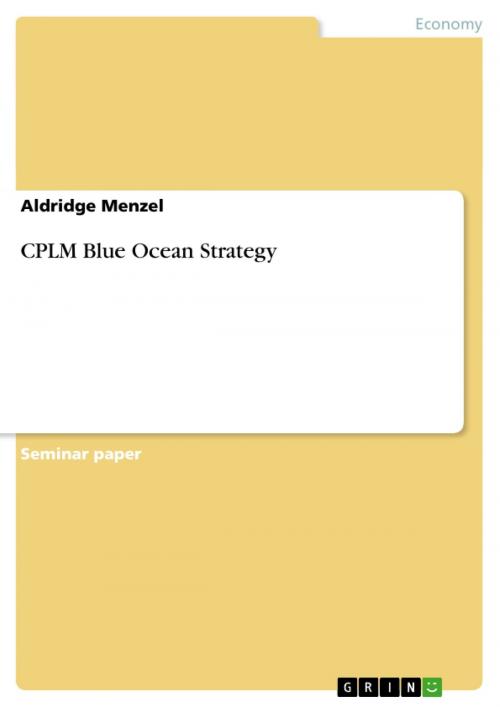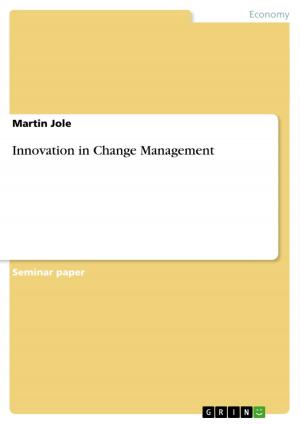| Author: | Aldridge Menzel | ISBN: | 9783656625636 |
| Publisher: | GRIN Verlag | Publication: | March 31, 2014 |
| Imprint: | GRIN Verlag | Language: | English |
| Author: | Aldridge Menzel |
| ISBN: | 9783656625636 |
| Publisher: | GRIN Verlag |
| Publication: | March 31, 2014 |
| Imprint: | GRIN Verlag |
| Language: | English |
Seminar paper from the year 2011 in the subject Business economics - Business Management, Corporate Governance, grade: B, University of Canberra, language: English, abstract: This paper is an attempt to explore the Blue Ocean Strategy which surfaced in the year 2004 and within a few months, it revolutionised thinking patterns and decision making processes of many firms around the world. The terms 'red oceans' and 'blue oceans' became the part of the business dictionary and many business related journals started using these terms. It links to the themes of 'critical response' and 'critical thinking' because the very creation of Blue Ocean Strategy is a challenge or disapproval of the entire field of strategic management, the field of study which has been studied, explored and discussed by many well-known authors over the past five decades and even before that. Where strategic management has been constantly emphasising to outclass the competition, blue ocean strategy cites this approach as short minded and insufficient and instead, preaches the creation of blue oceans to make the competition irrelevant. The reasons why authors of this strategy came up with the blue ocean strategy was because the engaged in the process of critical thinking and critical response and gathered the courage to challenge the mainstream and widely held assumptions about competition. Despite the fact that concepts of innovation and creativity did exist before the advent of blue ocean strategy, Blue Ocean Strategy provided the business and an academic world with a new lens to look at innovation, creativity and value creation (Thompson & Strickland, pp. 314-316, 2003). When as of today, there are many scholars which disagree to the theory as cite it as irrelevant, inconsistent and not having enough theoretical and research grounding. On the other hand, there are scholars who are engaged in the process of defending the theory thus creating an ongoing process of dialogue, critical thinking and critical response. The paper also explores those criticisms and makes an attempt to provide the answers for them.
Seminar paper from the year 2011 in the subject Business economics - Business Management, Corporate Governance, grade: B, University of Canberra, language: English, abstract: This paper is an attempt to explore the Blue Ocean Strategy which surfaced in the year 2004 and within a few months, it revolutionised thinking patterns and decision making processes of many firms around the world. The terms 'red oceans' and 'blue oceans' became the part of the business dictionary and many business related journals started using these terms. It links to the themes of 'critical response' and 'critical thinking' because the very creation of Blue Ocean Strategy is a challenge or disapproval of the entire field of strategic management, the field of study which has been studied, explored and discussed by many well-known authors over the past five decades and even before that. Where strategic management has been constantly emphasising to outclass the competition, blue ocean strategy cites this approach as short minded and insufficient and instead, preaches the creation of blue oceans to make the competition irrelevant. The reasons why authors of this strategy came up with the blue ocean strategy was because the engaged in the process of critical thinking and critical response and gathered the courage to challenge the mainstream and widely held assumptions about competition. Despite the fact that concepts of innovation and creativity did exist before the advent of blue ocean strategy, Blue Ocean Strategy provided the business and an academic world with a new lens to look at innovation, creativity and value creation (Thompson & Strickland, pp. 314-316, 2003). When as of today, there are many scholars which disagree to the theory as cite it as irrelevant, inconsistent and not having enough theoretical and research grounding. On the other hand, there are scholars who are engaged in the process of defending the theory thus creating an ongoing process of dialogue, critical thinking and critical response. The paper also explores those criticisms and makes an attempt to provide the answers for them.















